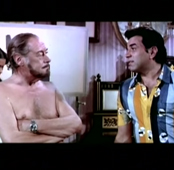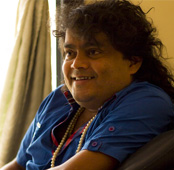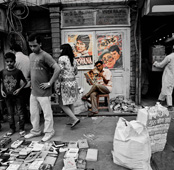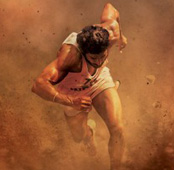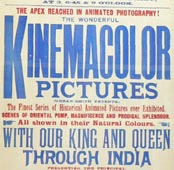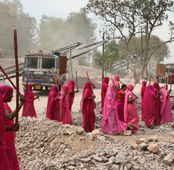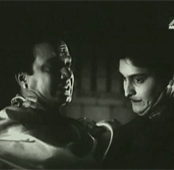-
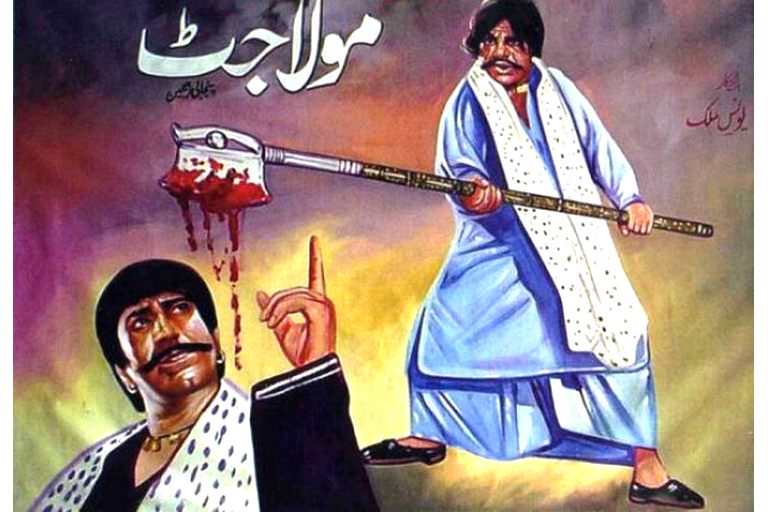 Artwork from poster of Maula Jatt
Artwork from poster of Maula Jatt
Musharraf Ali Farooqi on the secret subtext of a cult Pakistani film
Sometime in the 1970s the elders of a secret, Punjab-based foot-worshipping cult met at their Lahore headquarters. At issue was the recent decline in new recruits to the faith. One of the underlying reasons for this trend was the non-availability of the teachings in printed format that can be handed out to potential converts. But the publication of the long awaited Foot Worshippers’ Bible had been delayed again for security reasons. It was a difficult time for all minorities and smaller creeds. A lot of blood had been spilled in Punjab not too long ago over the religion issue. The elders had reason to be nervous. The publication of the book would draw unnecessary attention toward their small, vulnerable and select community.
There were no easy solutions to the dilemma being faced by the cult. Just when the elders were going to adjourn to reflect some more on the issue, a member offered a thought: as a way of getting their message out to the masses, the sum total of the ideology should be embedded in a love story and made into a cinematic production. This Manichean idea struck a chord with the elders. This unconventional but clever, avant-garde method of subliminally disseminating their message was just the thing to get them out of their predicament. The converts would follow in large bunches.
A vote was taken. The minor disagreement in the group showed in the few ‘no votes’ that were cast, but the majority were in favor. And so it was decided.
Embedding the foot, the leg and other associated symbols into this love story of unrequited love between two men was not easy, but it was not a challenge the highly creative elders could not overcome when they put their minds to it. By the time they congregated for their next meeting, they had found a way to do it. Fooling the Censor Board did not require much inventiveness but it was best to observe caution: relevant tactics were carefully discussed before they were adopted. The producer and the director were vetted and brought on board next.
The rest is well documented. Upon its release in 1979 the movie titled Maula Jatt was an instant box office hit. The elders were successful beyond their wildest dreams. Millions were converted to the faith. But intolerance had risen in the society, and the ever careful elders decided that the members of the cult must continue to observe secrecy about their identity. Even today, one would find millions who would profess to be Maula Jatt fans, but not one of them would admit to being a closet foot-worshipper. As a result, there have been no proper studies that tell us about the underlying symbolism of the movie. A lot of questions remain unanswered.
The author of this essay does not by any means profess it to be a comprehensive study of the kind needed on the subject. It is but a humble attempt which he hopes will set the path and pave the way for future scholars to carry out more detailed work. The questions that require in-depth analysis of the movie and its sub-plots and which were beyond the scope of this essay are listed at the end. Those who mistake it for a film review will be invariably disappointed.
*
From the opening scene, the supremacy of the human foot is established when a certain lady in distress in a tight-fitting blue dress outruns a horse on which a villain is pursuing her. He manages to catch up with her only when she trips and falls.
But she has reached a safe haven. A protector has been found in the person of the mother of Maula Jatt. When the villain named Makha who is brother to the notorious Nuri Nutt perseveres in his evil intentions, Maula Jatt’s mother calls out to her son for help.
We have our first, feet-first introduction to Maula Jatt. We do not see his face, only his feet in stirrups. This style of introduction in which a character enters the movie feet first is based on the concept of breech birth when the child exits the birth canal feet first and would be repeated for another two powerful male characters.
Maula Jatt accosts Makha and passes his judgment after witnessing the situation: Makha had broken the peace pact between the Jatt and Nutt clans; therefore he must marry the lady in the tight-fitting blue dress (whom Maula Jatt has just now made his sister). Moreover, Makha Jatt must give his sister in marriage to someone in Maula Jatt’s clan. When Makha makes light of the demands, Maula Jatt’s best friend Mooda beats him up.
The lady in blue now delivers a powerful kick to Makha herself, and breaks into a bout of hysterical laughter. Then, after pounding the ground powerfully in a joyous dance, she gratuitously falls dead due to excessive bleeding from her feet. Thus, shortly after the feet-first birth of a character, we witness a character exiting the stage by dying through the feet.
Maula Jatt tells Makha that he had escaped his punishment; he should return and make preparations for his sister’s marriage, for Maula Jatt would be coming soon with Mooda in a wedding procession to bring her away as a bride. Makha returns home with his tail between his legs, only to be shot dead by his trigger-happy sister Daro (the lady in the tight-fitting pink dress with the rifle) for his sheer inability in kidnapping and raping a girl. She gallops away to kill Maula Jatt herself, and is accosted by Mooda along the way. She asks him to follow on his bullocks cart so that he could help her carry away Maula Jatt’s corpse. When Mooda learns that she is Nuri Nutt’s sister, he informs her that he is set to become Nuri Nutt’s brother-in-law himself. Daro trains her rifle at him but before she could give him a fitting reply, an unfortunate incident occurs. Police arrives on the scene and Daro is arrested on the charges of murdering her brother.
It is time to introduce the person who would complete the heroic presence in the movie. Enter Nuri Nutt, feet-first, walking in leg irons.
He is in jail. The search of a worthy adversary has defined Nuri Nutt’s life so far. He has searched every jail but never met any mighty champion who can be his match. He clearly states that he wants someone who would mark his skin. Someone whose name would give him shivers and keep him awake at night. But alas such a one is nowhere to be found.
Cut to Maula Jatt. We learn that a certain lady named Makho is in love with him.
Lady Makho ambushes Maula Jatt in an empty garden by locking her feet around his neck and moving them vigorously, her ankle-bells creating a violent symphony. Then she performs a dance number for him, employing her feet and hips. We notice that Maula Jatt watches intently the pounding of her feet but moves away disinterestedly when she begins grinding her hips. This is a very important scene. In its earlier part Makho leads us to believe that she knows about Maula Jatt’s preferences, then disappoints us. One may legitimately ask Makho what she was thinking when she offered Maula Jatt the swaying offering of her hips. This scene conclusively proves that Makho’s love for Maula Jatt is not a mature love.
Upon hearing of Daro’s killing her brother, Maula Jatt goes running to post Daro’s bail but does not reveal his identity. She comes out of the jail and tells him that the one who has come to post her bail would do her a greater favour by bringing her Maula Jatt’s tongue as a Happy Release gift. Maula Jatt begins to understand the lady. He accompanies her to the precincts of her village and hastily returns home. But Daro has not forgotten her duty. She snatches a gun and sets out to kill Maula Jatt. But this time too she is foiled. She first runs into lady Makho and then the irascible Mooda. This martial lady even goes through the humiliation of Mooda doing a song and dance number for her. She curses her luck that Nuri Nutt is still in jail.
Cut to Nuri Nutt. He has done his time and about to be set free.
Upon leaving the jail Nuri Nutt earnestly hopes that he finds an adversary who would throw him down and tear him in apart by his legs. He turns up at another police station and makes a statement about how his feet have become embarrassed searching everywhere for an adversary.
He earnestly hopes that he may find a worthy one who may kill him and release him from his quest, or else he would have to kill the adversary and return to the jail. He sets out once again in his quest and heads to the house of Malik Haku, who has the reputation of being a tough, to see if he would give him satisfaction.
Malik Haku is tough, alright. Why? Because we see him feet first. But we immediately suspect that Malik Haku is a spent force. Why that? Firstly, from Nuri Nutt’s expression of dissatisfaction when he first beholds him. But mainly, because Malik Haku is coming down a staircase, not ascending one. Malik Haku himself verifies our suspicions. He confesses that he is no longer as tough as he was in the good old days. Some years ago a Jatt was born who began populating the graveyard with members of Malik Haku’s estate, and Malik Haku gave up his activities as a tough after losing his near and dear ones. Nuri Nutt demands to know the name of Malik Haku’s enemy but he refuses to divulge it.
After making a sarcastic comment, Nuri Nutt leaves him and decides to head to a fair where rough baddies of all sorts would come from among whom he hopes to find one tough enough to satisfy him. There too Nuri Nutt is disappointed as the goons participating in the fair are no match for him. He expresses great dissatisfaction with the land of Punjab that had stopped giving birth to strong men.
He next calls on his sister who tells him all that had transpired while he was locked up and also gives him Maula Jatt’s name. Nuri Nutt learns from Miss Daro about the Maula Jatt phenomenon and what a pest Mooda has been. Nuri Nutt demands to know if the sun still rises from the east, because his ears are not used to tales of such humiliation of his family.
He gallops off to Maula Jatt’s village to sort out a few urgent issues, only to find his way blocked by an oxen cart which had been stuck on a bridge. Nuri Nutt yokes himself and tries to pull the cart out but fails despite putting the very best effort of his legendary strength. Then suddenly, the cart moves. Startled, Nuri Nutt looks and sees that sharing the yoke with him is a fine mustachio.
Cut to Maula Jatt, admiring Nuri Nutt with a similar expression.
And here we must pause to savour the fireworks. The flame of love that unmistakably lights up in their hearts can be clearly seen in the glow of the looks of mutual admiration they exchange. Nuri Nutt demands to know Maula Jatt’s name but he does not give it to him. But we know that a friendship has been struck. They part after shaking hands and each making friendly promises to eliminate the other with his entire tribe.
Nuri Nutt enters Maula Jatt’s village and is challenged by Mooda. Nuri Nutt demands Maula Jatt’s tongue on the platter of his hand because he had defiled his sister by uttering her name in public. Then he revises his demands and asks for Maula Jatt’s hand as well because it had been raised on his brother. Here Mooda pipes up that it was not Maula Jatt’s hand but his own foot that had marked Makha. Nuri Nutt urgently demands Mooda to make him an offering of his foot and place it on his hand. Mooda suggests that if Nuri is not careful the same foot could also defile his nose. As an afterthought he also asks him to take good care of his hand with which he has to put his sister in her doli. Nuri delivers Mooda a fine beating.
Then Nuri Nutt proceeds to break an item of utmost dignity that must never have been harmed or desecrated: Mooda’s foot. Not only that, he makes a statement of great significance: “Now when you walk with the help of crutch, it would not make the sound of tak, tak, tak, but the sound of Nuri Nutt, Nutt, Nutt!” This is a stark reminder to everyone that the human identity resides in the foot and when one becomes weak, the appropriation and colonization of the supreme bodily asset may occur to a degree where the colonized completely loses its identity to the colonizer.
Maula Jatt’s mother does what she does best. She calls out to Maula Jatt, censures him and informs him of Nuri Nutt’s arrival. Maula Jatt goes to his father’s grave and digs up the gandasa which he had buried after the peace pact between the two clans. He heads to Nuri’s village where he disembowels some men for practice and proceeds onwards.
Maula and Nuri finally meet again and learn each others’ identities. Maula Jatt demands Nuri Nutt’s foot on the platter of his hand (in compensation for Mooda’s broken foot) so that the feud can be settled. Nuri Nutt asks him to hold it while he takes a good look at Maula Jatt. Then he thinks aloud that it is too much for a creature with two legs, two arms and a head to make such a demand of a member of a Nutt clan. He demands Maula Jatt to cut off his tongue and give it to him. Maula Jatt retorts that Nuri should cut off his tongue instead and give that to him with one hand, and his foot with the other. This leads to a skirmish of sorts in which Nuri Nutt is wounded before another unfortunate accident occurs, when the police arrive and break up the fight.
The two continue their friendly verbal exchange in their own manner at the police station. Now accompanied by a number of midgets and policemen, the two men leave the police station for jail in a procession of tongas. We hear what is perhaps the first love song between two men in a Punjabi movie, sung by the midgets and the supporters of the two men, while they fondle each other with sidelong glances.
Before they part we see some midgets riding piggy back who break into a fight before the scene ends. Finally, to maintain peace in the area, it is decided that both Maula Jatt and Nuri Nutt should be put under house arrest.
For all we know, Maula Jatt would have bided his time in peace but he is not destined to. Lady Makho decides to make the most of his confinement by resuming her songful gyrations. Mooda also keeps limping up and down in plain sight of him. Maula Jatt just can’t take it. He breaks his confinement and runs away.
On the other end Nuri Nutt is keeping his wound fresh by daily opening it up with his axe. He is not a home body. Daro also wants him to be out and about collecting tongues and feet. Meanwhile she has found a fiancé, Akkoo, and he is deputed on similar duties. Before ennui claims him Nuri Nutt also runs away from home by breaking the police cordon.
The police contingents are in pursuit of the two absconders and their bullet ridden bodies fall close to each other. They creep towards each other and their outstretched hands meet. They smile and repeat their oft repeated vows of severing each other’s choice parts.
Cut to the hospital ward where our heroes lie, in the pink again and exchanging manly pleasantries separated by doctors and police.
Nuri suggests that Maula Jatt should make his ablutions before the next fight because nobody would give the last bath to the single piece of meat that would be left of him when he is done with him. Meanwhile Daro and Makho enter the ward, exchange slaps and are admitted into the room where they exchange more slaps before settling down.
The two men decide that the best way to get rid of the police is to pretend to have reached a peace accord. The police are easily fooled and set them free. Meanwhile Daro has enlisted her fiancé to bring her Maula Jatt’s mother to use as her maid in their future home. Akkoo is unable to carry away Maula Jatt’s very fat mother on his horse. She raises the alarm and Maula Jatt answers the call by killing Akkoo. He declares that instead of mehndi, Daro’s hands should be painted with Akkoo’s blood on the wedding day. He sends sweets and Akkoo’s body to Nuri Nutt’s house and prepares to take the wedding procession on the day of the full moon.
Nuri Nutt and Daro receive the sweets and Akkoo’s body and prepare to convert Maula Jatt and Mooda’s wedding procession into a mass funeral.
Mooda’s wedding procession leaves from one end and Nuri Nutt’s warrior force from the other. They meet in the middle and Maula Jatt announces to Nuri that he has not come as an enemy but as justice: to claim a foot for a foot and a sister for a sister. Nuri Nutt asks him to stop talking and start pulling out his tongue. A free-for-all follows in which many are killed from the Nutt tribe. The sight greatly pleases Nuri and he enters the fray himself only to be beaten up by Maula Jatt. Just as he is about to collect Nuri Nutt’s leg himself with the help of his gandasa, the martial Daro melts and asks for mercy for her brother. While Maula Jatt relents and refrains from cutting off Nuri’s leg, Nuri cannot take this insult to his dignity. He quickly severs his leg with his own hand and offers it to Maula Jatt saying, “I would not even accept heaven if it was given to me in charity. This is but a leg! Take this as your justice, and I will think of this as a reward for your bravery and forget all about it! Go Maula, take a piece of my heart (Daro) and a part of my body (the leg)!”
Maula Jatt now throws away his gandasa once more and asks for it to be buried and a plaque that should read, “Humanity does not want revenge. It wants justice!”
In that as in everything else that has gone before, both he and Nuri are on the same page.
*
The author of this essay is cognizant of the fact that it leaves a number of questions unanswered. For example:
1. Both Maula Jatt and Nuri Nutt are fettered in a way when they are first seen. Maula Jatt by his stirrups and Nuri Nutt by his leg irons. While the author could not decipher the symbolism behind it, he could venture that because Maula Jatt is first seen with his feet in the stirrups and dangling, it perhaps is symbolic of a fanciful disposition. By the same token Nuri Nutt walking on the ground in leg irons could be symbolic of his having a more earthy disposition. How these symbols play out and influence the course of the movie and the libido of the two heroes should be carefully studied.
2. How did two non-Punjabi males – the Urdu speaking Sultan Rahi in the role of Maula Jatt, and Sindhi speaking Mustafa Qureshi in the role of Nuri Nutt – become the two iconic Punjabi male symbols? Was Mustafa Qureshi’s earlier dialogue a part of the script, in which he lamented that the land of Punjab had stopped giving birth to strong men, or was it inserted by him as a snide remark? The many drafts of the scripts should be studied and the prompter’s accounts documented to get to the bottom of this mystery.
3. The movie begins with a female foot. But clearly the theme changes to become all about the male foot. What does this tell us about the religious preferences and biases of the cult, and how do these biases play out in the movie?
4. What is the role and significance of midgets in the foot-worshippers’ cult?
5. If we view the story as a quest for the villain Nuri Nutt’s foot, what is the ultimate message of the movie? Why is it not a quest for Maula Jatt’s foot?
6. What becomes of Nuri Nutt’s leg and who has the greater claim on it? It was demanded as compensation for Mooda’s leg, and was bestowed as a medal of bravery by Nuri Nutt on Maula Jatt. But would it decorate Maula Jatt’s house or Mooda and Daro’s home? They both have equal claim on it. Nuri Nutt has complicated affairs by rewarding it to Maula Jatt at the same time.
7. Regardless of who takes the foot home, we know that it should be displayed conspicuously. But would it be displayed when Nuri Nutt calls on Maula Jatt, or visits Daro and Mooda to have tea with them?
The essay was first published in The Popcorn Essayists: What Movies do to Writers by Tranquebar/ Westland.
Also read:
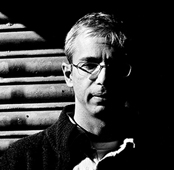 EYE OF THE BEHOLDER: MUSHARRAF ALI FAROOQI
EYE OF THE BEHOLDER: MUSHARRAF ALI FAROOQI
The Foot-Worshipper’s Guide to Watching Maula Jatt
ArticleMarch 2013
 By Musharraf Ali Farooqi
By Musharraf Ali Farooqi
Musharraf Ali Farooqui is an author, novelist and translator. His latest novel, Between Clay and Dust, was shortlisted for The Man Asian Literary Prize, 2012, and longlisted for the 2013 DSC Prize for South Asian Literature. Farooqi's first novel The Story of a Widow was shortlisted for the DSC Prize for South Asian Literature. He has also written an illustrated novel, Rabbit Rap (with art by his wife, Michelle Farooqi), and Tik-Tik, The Master of Time for children and translated The Adventures of Amir Hamza and the first book of a projected 24-volume magical fantasy epic, Hoshruba.




